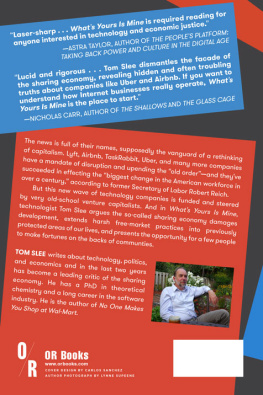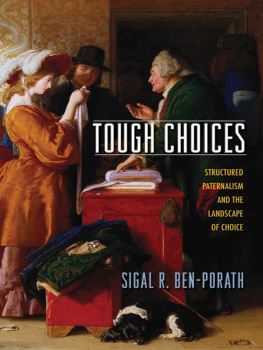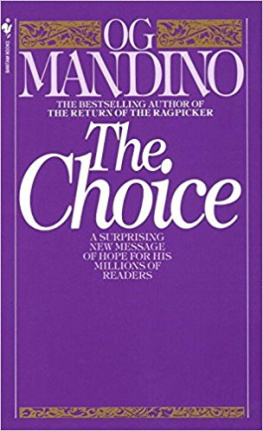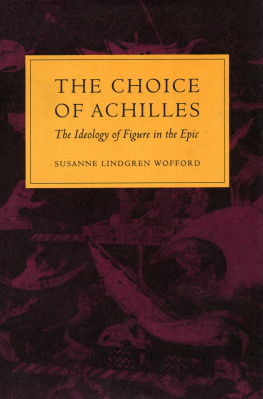NO ONE MAKES YOU SHOP AT WAL-MART
NO ONE MAKES YOU SHOP AT WAL-MART

the surprising deceptions of individual choice
TOM SLEE

No One Makes You Shop at Wal-Mart
2006 by Tom Slee
First published in Canada in 2006 by
Between the Lines
401 Richmond Street West, Studio 277
Toronto, Ontario M5V 3A8
1-800-718-7201
www.btlbooks.com
All rights reserved. No part of this publication may be photocopied, reproduced, stored in a retrieval system, or transmitted in any form or by any means, electronic, mechanical, recording, or otherwise, without the written permission of Between the Lines, or (for photocopying in Canada only) Access Copyright, 1 Yonge Street, Suite 1900, Toronto, Ontario, M5EIE5.
Every reasonable effort has been made to identify copyright holders. Between the Lines would be pleased to have any errors or omissions brought to its attention.
Cataloguing data available from Library and Archives Canada
ISBN 978-1-897071-88-5 (epub)
ISBN 978-1-897071-06-9 (print)
ISBN 978-1-771130-77-6 (PDF)
Cover design by Jennifer Tiberio
Page preparation by Steve Izma
Between the Lines gratefully acknowledges assistance for its publishing activities from the Canada Council for the Arts, the Ontario Arts Council, the Government of Ontario through the Ontario Book Publishers Tax Credit program and through the Ontario Book Initiative, and the Government of Canada through the Book Publishing Industry Development Program.

To Lynne, Jamie, and Simon
CONTENTS
FIGURES
The possible outcomes of Jack and Jills divorce
The prisoners dilemma
The prisoners dilemma using standard terms
Jills best choice
The prisoners dilemma as a graph
The Journal and The Courier
The corn-chip problem: first attempt
The corn-chip problem with impatience
Sneaker preferences at Whimsley Mall
More sneaker preferences at Whimsley Mall
Choosing a nightclub
School selection in Whimsley
Brand-name vs. word-of-mouth products
The bare ultimatum game
The dressed ultimatum game
ACKNOWLEDGEMENTS
WHEN YOU PUBLISH YOUR FIRST BOOK at age 46, a lot of people have influenced whatever thoughts make their way onto the printed page. Here is a partial list, with apologies to those I have overlooked.
The book is largely a popularization of other peoples ideas. I am indebted to all those who carry out the rich and detailed academic work that forms the basis for the descriptions contained here. Those whose works I have returned to over and over again include George Akerlof, Robert Axelrod, Jane Jacobs, Rachel Kranton, Paul Krugman, the late Mancur Olson, Anatol Rapoport, Thomas Schelling, Amartya Sen, and Joseph Stiglitz, none of whom bear any responsibility for my mangling of their thoughts.
You cant make an appeal for the virtues of collective action without having some good collective experiences. I am lucky to have had several. Many thanks to those from the following groups for their intelligence, support, friendship, and inspiration at various points in my life: Park Village 13 and National Organization of Labour Students (Sussex), the RFW Bader lab at McMaster University, the Canadian Union of Educational Workers (especially Local 6),Hamilton Central America Solidarity Committee, Ontario Central America Solidarity Network, Tools For Peace, Action Against Militarism, and colleagues at Sybase Waterloo. Matthew Caunt, Lawrence Welsh, Garry Brennand, Barb MacQuarrie, and Claudio Chuaqui also deserve special mention. Families provide particularly important collective experiences: Frank, Audrey, Jeff, John, and Liz Slee shaped whatever ideas I have now. Lynne, Jamie, and Simon continue to do so.
Many people have commented on drafts of this book. In blatant violation of all notions of self-interested behaviour, Jim Stanford provided an invaluable endorsement to a complete stranger. John Slee and Graeme MacQueen read multiple drafts of this book. They helped to shape the work in its early and middle stages and provided the right mix of encouragement, criticism, and new ideas.
In later stages the staff and readers of Between the Lines helped to turn a manuscript into a book. My thanks to Paul Eprile, Jonathan Barker, Jennifer Tiberio, Steve Izma, and Andrea Kwan for their contributions to different parts of this process, and to Robert Clarke, whose editing has sharpened presentation throughout. Thanks in particular to Gillian Barker, who contributed at all levels by identifying priorities, deepening arguments, and untangling knots throughout the manuscript; her ideas and insights have been invaluable. I am responsible for those confusions and inaccuracies that remain, despite the best efforts of all these people.
Inspiration for this book comes from the example of three admirable women:
Jacquie Perey (1964-2004), whose continual challenging of those around her was matched only by the challenges she set herself. In her last letter to me, she asked whether I was pursuing any magical projects and strongly suggested that, if not, I should start doing so right away. It is difficult to argue that game theory is magical, but this is as magical as I get. Thank you Jacquie.
Audrey Slee, who has demonstrated by a half-century of continual political activity and civic commitment that real changes can be made to peoples lives if you stick to it. Thank you Mum.
Lynne Supeene, who has provided emotional and intellectual support and companionship over the several-year period during which this book was written. She has been unfailingly helpful in identifying which strands of this book to pursue and which to drop. She knows when to encourage, when to push a little, when to make suggestions, and when not to. Also, by the way in which she has pursued and succeeded at her own writing, Lynne has been an inspiring example. Thank you Lynne.
Tom Slee
chapter one
A WORLD OF CHOICE
WE LIVE IN A WORLD OF CHOICE.
We make choices every day. We choose the clothes we wear, the way we travel, the movies we watch, and the places we shop. From time to time we make bigger choices as well: the neighbourhoods we live in, the jobs or universities or schools we go to, and even the cultures we identify with. These choices give us a measure of control over our lives, and it seems natural to believe that individual choice is, almost by definition, a good thing.
Members of the political right have long believed in its virtues, but now individual choice has also gained a much broader appeal. Individual choice is being promoted, to different degrees, across the political spectrum as a key ingredient in the recipe for economic prosperity and political freedom.
The recipe has an appealing common-sense simplicity. First, let the people choose. Second, let suppliers compete to give us what we want. Finally, let the invisible hand of the free market provide efficiency, innovation, responsiveness, and growth.
Whats more, individual choice appears to be on the side of the powerless. No one, after all, makes you eat at McDonalds, drive Ford cars, wear Nike shoes, or shop at Wal-Mart. In our role as consumers, we can choose to walk away from the sales pitches of even the largest multinational corporations. Consumers are sovereign, and multinationals are their subjects.
Next page








